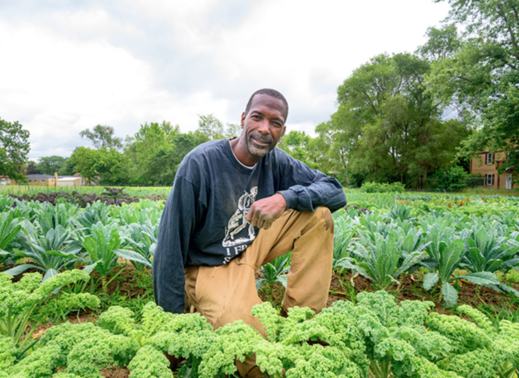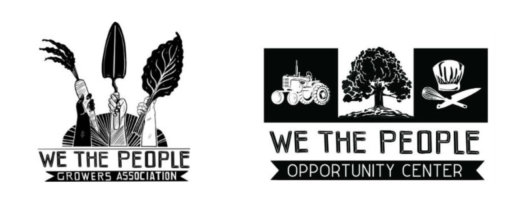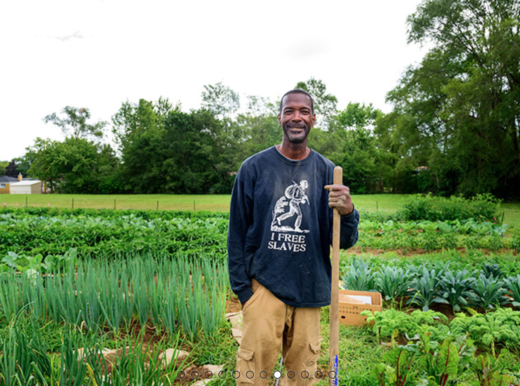Melvin Parson and I have been working off an on for the past two years on an interview for this site. It began as an Ypsilanti Immigration Interview, and, over time, as we dug deeper into his work with We The People Growers Association, evolved into something more about his dream of establishing a world-class urban farm here in Ypsilanti… Well, in the past few months, with the support of a number of organizations, like St. Joseph Mercy Health System, that dream of Melvin’s has started to coalesce into something that appears to be both real and achievable. And, given that, we’ve decided to go ahead and post the interview to coincide with the announcement that, between now and March 8, St. Joe’s will be matching donations to Melvin’s new non-profit up to a total of $50,000. So, after reading through this conversation of ours about Melvin’s work to establish an urban farm in Ypsilanti — one that would both empower young people and provide dignified employment and training for men and women returning home from incarceration — I’d appreciate it if you would consider making a donation.
[The photos accompanying this interview appear courtesy of my friend Doug Coombe, who had the opportunity to spend time with Melvin not too long ago on assignment from Concentrate.]
MARK: Let’s start with the easy stuff. What’s your name?
MELVIN: Melvin Parson.
MARK: And where were you born?
MELVIN: A small, one horse town called Detroit.
MARK: What was Detroit like, back when you were a kid?
MELVIN: Detroit, or at least my neighborhood, was a safe place to live from what I could tell. Although, keep in mind, the African American community was still struggling to come out from underneath a heroin epidemic. But, when I was growing up there, there wasn’t a lot of gun violence. Street gangs were prevalent, but I felt safe, even though it was insisted that come home when the street lights came on. In the ‘80s, though, I could see things around me beginning to change, as another wave of the heroin epidemic approached.
MARK: And what do you remeber Detroit being like culturally at that time?
MELVIN: White flight had happened after the riots in the ’60s, so I remember Detroit being predominantly Black. I remember unity. I remember block club parties, swim mobiles, rec centers.
MARK: So, how did you get from Detroit to Ypsi?
MELVIN: I actually arrived in Ann Arbor on May 4, 2004 from a substance abuse treatment facility near Port Huron.
MARK: Did you choose Ann Arbor, or were you entering a transitional program of some kind that just happened to be there?
MELVIN: I actually didn’t choose Ann Arbor. Ann Arbor was chosen for me by a string of events which happened while I was at the substance rehab facility near Port Huron. While I was there, something inside of me said to me that, if I wanted to get my act together, then I couldn’t go back to Detroit. And, that very same day, three separate individuals told me about a town called Ann Arbor, and a place called Dawn Farm… So I just went with the “nudge.”
MARK: And when did you become aware of Ypsilanti?
MELVIN: I’ve been aware of Ypsilanti for quite some time, but not from a positive perspective… Back in the early ‘80s, I travelled to Ypsilanti from Detroit to sell drugs on the southside. So I find it to be such sweet irony now that I now live in the same area, trying to give back to a community which I once helped to dismantle.
MARK: Do you know the circumstances of your birth?
MELVIN: My biological mother had me at a very young age, so her parents, my grandparents, legally adopted me, making me their son.
MARK: How much of this were you aware of this as a child?
MELVIN: I wasn’t… I didn’t officially find out until I was 17.
MARK: If you don’t mind, I’m curious as to the dynamics between you and your birth mother, assuming she was still around during your childhood. I’ve heard a number of stories over the years about people having been brought up by their grandparents, not knowing that their older sister was really their mother, but I’ve never heard anyone having been brought up that way talk about the relationship between themselves and their mother/sister. And I was just curious if maybe she treated you differently than other siblings. I guess I’m asking if you got a maternal sense from her… Did you suspect that she might be your mother?
MELVIN: In my early teens I began to suspect she was my mother because the elders that knew us, and knew my family, would sometimes unwittingly ask how my mother, Marjorie, was doing? She wasn’t around much as I was growing up, though. She had her own challenges and demons to contend with. We have a good relationship now, however.
MARK: How are you most different from your grandparents/parents?
MELVIN: They were very responsible, reliable and dependable… It’s taken me up until now to exhibit these characteristics.
MARK: Why do you think that is?
MELVIN: Environment and rebellion.
MARK: What kind of kid were you?
MELVIN: I was pretty smart, I guess. I was athletic. I always felt awkward, though, and out of place in the world.
MARK: What’s your first memory?
MELVIN: My first memory, I believe, was holding onto my grandfather’s/father’s hand, or finger. I must have been around three years old.
MARK: Is there a story that you can tell us about your grandfather/father, that sums up the kind of man that he was?
MELVIN: He was a man’s man. He took care of, and helped to provide for, his family in a way that men should. He wasn’t much for words, and probably didn’t complete high school. Yet he worked hard, and earned a decent wage as a brick mason. He was a man of integrity.
MARK: And what brought your family to Michigan?
MELVIN: I would imagine that my grandparents/parents moved here from the south as part of the Great Migration, in hopes of finding opportunity, and escaping the tyranny, oppression, lynchings, racism, and all the rest of it.
MARK: Did your parents/grandparents ever talk about that decision, what they left behind, and why they chose Detroit? Did they, for instance, have other relatives already here, working in the auto industry?
MELVIN: They didn’t talk a lot about why they moved. My grandfather/father did tell me he moved his family to Michigan because of higher wages. And they had two friends that lived in Detroit who were encouraging them to move.
MARK: What’s the first film or book that you were ever passionate about?
MELVIN: The first book I remember reading, and really being passionate about, was Black Beauty. The first film I remember really liking was the Wizard of Oz.
MARK: I’ve never read Black Beauty, but it’s about a horse that, over the course of his life, experiences the best and worst of what humanity has to offer, right? I mean, it’s kind of a morality play about kindness and cruelty, isn’t it?
MELVIN: Well said, Mark.
MARK: OK, I found a quote from the book… “(T)here is no religion without love, and people may talk as much as they like about their religion, but if it does not teach them to be good and kind to man and beast, it is all a sham.” Assuming that passage is reflective of the book, I can see how it might appeal to a young person with an awareness of social justice, and a strong sense of right and wrong.
MELVIN: Wow! I don’t remember that quote. Keep in mind, however, it’s been a long time since I’ve read the book. Nonetheless, those words resonate with me to my core here in the present time.
MARK: Having read other interviews with you, I know that you’ve spent a good deal of your life incarcerated. Do you mind talking about how his smart, athletic kid who loved Black Beauty came to find himself in prison?
MELVIN: Well, part of it is by systemic design… If people haven’t yet, I’d encourage the to watch the documentary called, 13th… The other reason has to do with a series of bad choices that were shaped by my environment.
MARK: Not too long ago, I was talking with author and prison rights advocate Shaka Senghor about the so-called “corrections” industry, and he was emphatic that we needed to shift our mindset from one of retribution to one of rehabilitation. I believe he said that about 90% of people in our prisons today will eventually be released, and we currently have a recidivism rate of something like 75%, which would indicate that we’re doing an absolutely terrible job of readying people for life on the outside. If any other industry had a 75% failure rate, Senghor said, we’d find it absolutely unacceptable. But yet we continue with this failed model, essentially just warehousing these people, or, worse yet, using them as a source of quasi-slave labor, with no thought as to their eventual return to society. So, with all that said, I’m curious as to your experience, and whether you feel as though, when you were inside, you were given the tools to be successful upon release.
MELVIN: My experience was what you described in part… I was simply warehoused… Again, the movie 13th really brings home what that whole system is all about.
MARK: OK, so tell us about your interest in growing and local food systems… How’d you get started down this path?
MELVIN: Well, things took root in the spring of 2014, when I came into possession of a 3’ x 9’ vegetable garden, and some plants that needed transplanting. Not that long after, I went down to the farmers market in Kerrytown, with the intention of learning about vegetables, the different varieties, what they looked like… And, during my whole time there, I didn’t see one person that looked like me. I didn’t see one African American man or woman. And that was the case on both sides of the table… the folks selling, and the folks buying.
MARK: And did that realization motivate you?
MELVIN: Yes. I believe it was in that moment that the universe said to me, “Melvin this is the table I want you to sit at.” My motto at that time, you see, was, “Either you have a seat at the table, or your ass is on the menu!” And I still believe that. So, when I saw that, it occurred to me that I should get a seat at the table. And not just that, but I also started thinking about bringing as many other people who look like me to the table as possible.
MARK: You mentioned your first garden. Where would this have been?
MELVIN: I was living in a property owned by Avalon Housing. They have a program called Edible Avalon. This program is designed for folks living there who want to grow their own food. Avalon provides tenants with seedlings and a space… generally a raised bed.
MARK: Had you ever grown vegetables before that?
MELVIN: Never! I’d tried growing flowering plants twice, and I failed miserably both times.
MARK: So how’d you go from that point, standing at the Kerrytown Farmers Market, to where you are now? What was your first step?
MELVIN: Well, in 2015, I became a member of a farming cooperative called The Cooperative at Dawn Farm. I joined for a year. I also created We The People Growers Association. And this is where the “table” for me began to take shape. In that year, I also created a community garden on Ypsilanti’s southside, which I maintained for two years. Then, in 2016, I started a second community garden. That one was in Ann Arbor.
MARK: And had you, by this point, attracted people to help you with these community gardens, or was it just you, growing produce by yourself in those communities? I seem to recall you mentioning to me at some point that neighborhood kids had started to come out to help, right?
MELVIN: By this point, what I was doing was beginning to make a bit of a ripple, but not much of one. But, yes, there were moments when a few kids in the community would show up on their own, or be brought there by a parent.
MARK: OK, at some point, you then got land of your own for a bigger garden, right?
MELVIN: Yes, in 2017, I had the opportunity to lease a ¼ acre of land from a church in Ypsilanti Township. And, with this, I had the audacity to believe that I could not only grow food, but start to sell it as a way to advance my vision.
MARK: And what was your vision at that point? What did you want to build? What did you envision We The People Growers Association becoming?
MELVIN: I wanted to create a sustainable growing system that could eventually support a workforce of both men and women returning home from incarceration.
MARK: So, how did you do on that ¼ acre?
MELVIN: To my surprise, enough food was produced to support 13 restaurants in Ann Arbor, and 3 in Ypsilanti. And I was able to hire one returning citizen!
MARK: What can you tell us about this first person who you hired?
MELVIN: His name is Emanuel Tyus and he’d recently come from Washtenaw County Jail. Mr. Tyus’s housing situation was precarious, and he was in need of employment. Mr. Tyus turned out to be the perfect first hire for We The People… He was middle-aged, and had a great personality. And he was a hard worker. Although farming wasn’t his thing, he worked hard nonetheless. He went on to find full-time employment elsewhere, and his housing situation is much more stable now. The “jam” for me is that, even though we didn’t retained Tyus as a permanent fixture of our operation, we were at least an employment bridge for him while he found something more to his liking. And, it’s worth mentioning, Mr. Tyus has not since been incarcerated!
MARK: Were you and Mr. Tyus growing mostly salad greens at this time?
MELVIN: We grew mostly collards, kale, chard, peppers and herbs.
MARK: And, this year, you started thinking about growing again, right?
MELVIN: Having proved the concept on the rented ¼ acre, I started thinking about having my own land. I wanted to build a world-class urban farm. And, with that in mind, I’m currently in negotiations with Ypsilanti Community Schools. They own a school that’s been closed since 2010, and I think it would be the perfect site for a world-class urban farm. The entire plot is 9.8 Acres, 5 of which are farmable. And there’s a 22,000 square foot building that I’d like to rehab, adding solar panels and geothermal components. This new low energy, sustainable building, within 5 years, could be home to a world-class culinary arts training program, a packaging and processing facility, and an events space specifically and intentionally designed to engage the surrounding community. And I think there could be great collaborations to be had, not just with Ypsilanti Community Schools (YCS), but also Eastern Michigan University, Michigan State University, and the University of Michigan, just to name a few.
MARK: Are the talks with YCS still moving forward? Do they seem willing? Have they given you a price?
MELVIN: To be honest, to date, the talks with YCS have been frustrating. No matter what we do, hurdles keep being placed in front of us. Each hurdle we jump over, there’s another one, despite all the rich resources I’m bringing to the “table” with me, like the United Way of Washtenaw County, St. Joe’s of Ann Arbor Mercy Hospital, and, our newest community partner, The Henry Ford. Nonetheless, we remain hopeful and optimistic regarding a partnership with them that would allow us to repurpose some land, and put together a program there that will positively impact the lives of some of their students for decades to come.
MARK: Did I also hear that you’d formed something like an advisory board?
MELVIN: I’ve actually had an advisory board for We The People Growers Association for some time. We recently created a 501c3 organization called We The People Opportunity Center, though, and this entity has a Board of Directors.
MARK: And, I don’t think I mentioned it earlier, but you live in Ypsi now, having been one of the first people to move into Parkridge Homes, the relatively new, 198-unit affordable housing community off of Armstrong Drive, right?
MELVIN: Correct! I’ve been living there for approx 2 years.
MARK: How do you like it so far?
MELVIN: It was challenging at first because I felt like an outsider… Most of the residents have known each other for generations, so it took some time for them to “accept” me. However, now that they have, I really enjoy being here, and building community with them. Most know me as a farmer, and they all love my dog.
MARK: As it’s the beginning of a new year, I should probably ask you what you’re looking forward to in 2019?
MELVIN: Building a World Class URBAN farm, meeting lots of new folks, and helping to “change the soil” in people’s lives.
MARK: I’ve heard you use that phrase before — “change the soil”. What do you mean by that?
MELVIN: “Changing the soil” means providing a rich environment where folks can flourish.
MARK: What would you like for people to know about you that they might not already know?
MELVIN: That I’m a father, a recent EMU graduate, and a champion of the “underdog.”
MARK: I just heard, through my network of informants, that you’re also now a Henry Ford Entrepreneur in Residence. What does that entail? …And, congratulations.
MELVIN: The Henry Ford started a new program called Entrepreneur in Residency. The Entrepreneur in Residence is a 6-month residency designed to cultivate entrepreneurial learning by showcasing each resident entrepreneur’s experiences to date, and by engaging their expertise in a project that connects The Henry Ford (THF) and the broader entrepreneurial community. It’s the program’s intent to highlight each resident entrepreneur as an inspirational force within the community of Southeast Michigan, the state of Michigan, and the nation. The Entrepreneur in Residence program is a rotating residency aimed at fostering a hub of innovation and entrepreneurship at The Henry Ford, with each rotation reflecting a blend of two of the museum’s themes.
MARK: Oh, one last thing. I just hear that St. Joe’s has said that they’d match up to $50,000 in contributions to We The People Growers Association between now and March 8. Is that right?
MELVIN: Yes! That’s correct, Mark! St. Joe’s believes in the potential impact that We The People Opportunity Center can have in the community so much that they’re investing some of their dollars into our efforts. Just to be clear, although We The People Growers Association still exists, it’s strictly focused on food production. We The People Opportunity Center, which we launched in December of 2018 as a 501c3, is our nonprofit arm. And it’s the Opportunity Center that all donations will go toward building — the nonprofit side of the world class urban farm that we’re building.
[If you’d like to donate toward seeing Melvin’s vision become a reality, and have your donation matched by St. Joe’s, just click here.]
















8 Comments
Great example of community building leadership… thanks Melvin and Mark!
Posts like these are much more positive than the Trump posts which end up being a fighting match between sad and lonely people who don’t have jobs. Please do more posts like this.
What a shitty life you must lead to go around trying to shit on people you don’t know all the time. One thing you are correct about is this is a good interview. If Baynard stuck to this kind of thing and stopped smearing people and lying all the time it would be great.
Big ups to Melvin for manifesting this tremendous vision. Why is growing so therapeutic? Maybe because plants do not care who we are or where we have been. If you take care of them they will respond and reward you in no time.
What a wonderful post! Thank you Mark and Melvin: Mark for shining the light on this amazing project for the MM.com community, and Melvin for your inspiring work. I donated just now.
I love seeing this kind of thing. I really do. And of course, I love the people from my hometown, Detroit too. :)
I donated to the cause and know Melvin well. He is a kind person and good farmer. Go Melvin go! And great interview.
Oh! I hope he can collaborate with YCS! Let me know if I can help (probably not but I can try!). And I’m going to read Black Beauty!
Great interview, great people!
Coming late to the party but…if you get mad about “Trump posts” and like this one, you aren’t thinking hard enough. If you think this Melvin has great story about overcoming adversity, you need to understand that Trump and his fans are working to create the adversity that Melvin had to overcome.
One Trackback
[…] family farms here in southeast Michigan sustainable again, and what Melvin Parson is doing with his We The People Growers Association. So, yeah, that’s the kind of thing that really captures my interest these days. I should add, […]